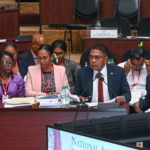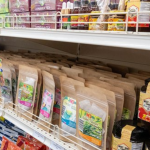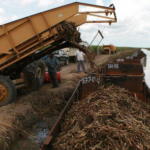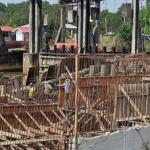– says no cash will be given to rice farmers, nonpartisan committee to assist with verification processes
– two weeks to compile lists of beneficiaries
Agriculture Minister Zulfikar Mustapha today met with rice farmers and fisherfolk from Region Two (Pomeroon-Supenaam) to discuss the planned relief initiatives recently announced by His Excellency President Dr. Mohamed Irfaan Ali and Vice President, Dr. Bharrat Jagdeo.
With the rising cost of fertilisers due to the closure of many factories across the world due to the global pandemic and the ongoing war between Russia and Ukraine, farmers have been finding it hard to purchase inputs such as fertiliser.
Additionally, fisherfolk have also been faced with hardships given the low level of catches received at sea over the past few months.
After taking note of the struggles of farmers and fisherfolk, the government upon reviewing its economic standing announced a $1 billion allocation to procure fertilisers for farmers alone with a $150,000 one-off relief grant for fisherfolk.
While speaking with rice farmers from the Essequibo Coast during a meeting in the Regional Democratic Council’s boardroom, Minister Mustapha told those present that rice farmers will benefit from $250 million worth of fertilizer to be used in time for the coming crop and that a committee comprising farmers from the various areas was tasked with compiling a list of beneficiaries.
“The last time we were here, the Vice President announced that the government will allocate $275 million to procure fertilizer to help the farmers in Region Two. $250 million will be used to purchase fertilizers for the rice farmers and $25 million will be for the cash crop farmers. We decided to have a nonpartisan committee selected by the farmers to guide the process so that at the end of the exercise we will not have the same issues we had with the flood relief. The committee for formed and based on feedback from the farmers it was recommended that the farmers should receive fertilizer based on the acreage they are cultivating. I’ve received a report and it is being suggested that the $250 million be divided by the amount of fertilizer that will be required for the crop. We’ll then source the fertilizer locally. So, for example, if a bag is $11,000, we’ll minus the amount that the government will subsidize and the farmers will pay the balance,” the minister disclosed.
One farmer suggested that farmers should receive monies to assist with returning to the land. He noted that as a result of last year’s flood, many farmers are still unable to return to the land.
However, Minister Mustapha said that the allocation was for the procurement of fertilizer given the rising cost of the fertilizers globally. He maintained that farmers will not be receiving the monies directly but rather the fertilizers based on what will be cultivated in the coming crop. He also reminded the farmer that many farmers were given flood relief assistance and seed paddy last year and that the government was in the process of completing that programme.
“Let us take our minds off of giving people cash. This money was allocated for fertilizers. We are not going to change that. The fertilizer will be distributed directly to the farmers. We are not giving cash. If we have two or three distributors of fertilizer on the Essequibo Coast, we’ll purchase from the most affordable supplier so that we can have more. We want a transparent process and we have to ensure that the committee captures accurate information,” Minister Mustapha said.
Other farmers while agreeing with the minister said that a cash payout for this initiative would result in issues similar to those experienced during the distribution of the flood relief grants.
Meanwhile, during his meeting with fisherfolk from the region, Minister Mustapha said that committees will be established at every landing site and the list of fisherfolks will be available for examination at the landing sites.
He told the fisherfolk present that the various fisheries officers will work along with them and officials from the Regional Democratic Council to form the committees. This process, he added, should be completed in two weeks, after which the verification process will commence ahead of the payout scheduled to commence in July.
“We’ll take the entire month of June to verify the names. Do not try to smart the system. The Fisheries Department will work to ensure a committee is set up at every landing site to verify the names so that there can be transparency. There are five major landing sites on the Essequibo Coast. Altogether we have about 16 because there are other small areas where boats come out,”
He told the fishermen that a study to determine the reason behind low catches was conducted by the United Nations Food and Agriculture Organization (FAO) and once it is finalized that study will be made public.
“We are seeing increases in some species. While engaging fisherfolks across the country I made a commitment that a study will be conducted to determine the cause of the low catches. We engaged the FAO and they conducted a study. I received the second draft which shows that Guyana is not the only country affected by low catches. It is a phenomenon around the world that is mostly due to climate change. That report will be shared as soon as the final draft is completed,” he noted.









